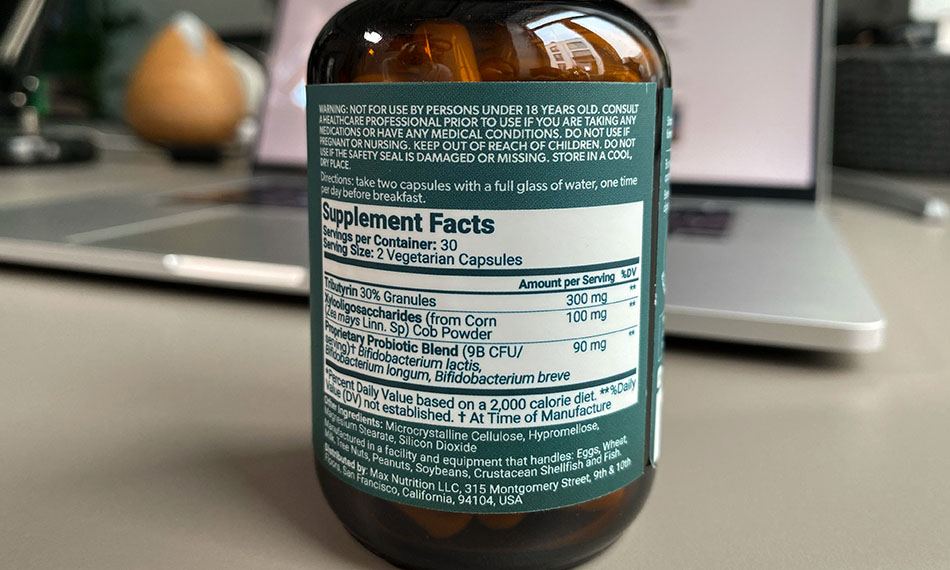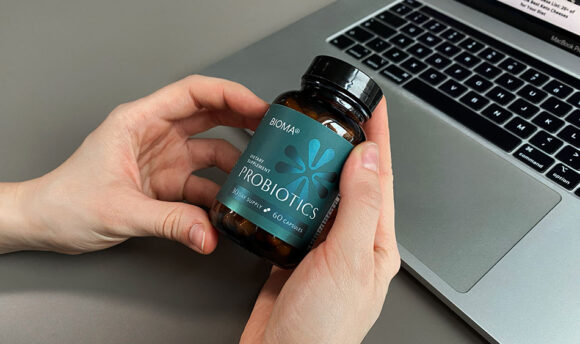Advice From a Registered Dietitian: One of the Simplest Ways to Relieve Constipation, Bloating, and Gut Discomfort
For anyone looking to improve their gut health, this article might be one of the most interesting reads. Because here, a registered dietitian delves into why gut health matters, the reasons behind its decline, and what anyone can do to combat gut discomfort.

Gut issues affect approximately 60–70 million Americans. This staggering number, given by the National Institutes of Health back in 2020, is likely even more troubling today.1
My name is Edibel Quintero, and I’m a registered dietitian. And for the past decade, I have dedicated my medical career to specializing in the field of nutrition.
What I’ve learned is that improving gut health is the most effective way to relieve constipation, bloating, and gut discomfort for good.
However, the rise in gut issues has prompted a surge of supplements and so-called expert advice – all promising the ultimate solution.
It’s becoming a real challenge to distinguish which of them actually work and which are just a waste of time and money.
That’s why I’ve decided to compile years of research and real-life experience and narrow it down to this article.
I will answer why gut health matters, why so many of us struggle with these issues, and share, in my opinion, one of the simplest ways to relieve constipation, bloating, and gut discomfort.
Why Good Gut Health Matters
The link between good gut health and gut comfort is quite direct. It ensures efficient digestion and nutrient absorption – while also preventing constipation, bloating, and diarrhea and mitigating the risk of other disorders. Like irritable bowel syndrome and inflammatory bowel disease.2
I’ve decided to answer this question right away because I see too many people treating gut discomfort as the norm. Or attempting to deal with the consequences instead of the cause.
For example, when having diarrhea, constipation, bloating, or any other gut issue, most people take antidiarrheal medications, laxatives, or something for gas and pain relief. While these can provide temporary relief, they do nothing to improve gut health and may even affect it negatively.
That’s a significant issue because the gut is closely connected to literally every system and organ in the human body. In essence, a healthy gut is a cornerstone of overall health and well-being.
Which bodily systems does healthy gut support?
✔️ Digestive system
A healthy gut ensures smooth digestion and proper nutrient absorption. It also prevents constipation, bloating, and gut discomfort and reduces the risk of disorders like IBS.2
✔️ Immune system
70–80% of immune cells are present in the gut, supporting a well-functioning immune system and preventing infections, inflammation, and certain health disorders.3
✔️ Nervous system
The gut produces various neurotransmitters and neuromodulators, which positively affect brain function, mood, and behavior.4
✔️ Endocrine system
A healthy gut supports the balance of estrogen, testosterone, ghrelin, leptin, cortisol, serotonin, and melatonin, regulating a wide range of bodily functions.5, 6, 7, 8, 9, 10
✔️ Cardiovascular system
The gut microbiome regulates the levels of certain metabolites, maintains a balanced immune response, and reduces inflammation, all of which contribute to heart health.11
✔️ Integumentary system (skin)
Gut health impacts the skin, too. While gut bacteria imbalance can cause inflammatory diseases like acne or eczema, a healthy gut can effectively prevent them.12
Why Our Gut Health Is Declining
The correlation between the gut and nearly every bodily system and organ is complex yet undeniable. Meaning that any disturbances in the gut can have a ripple effect throughout the body.
An unhealthy gut can manifest itself as an array of seemingly unrelated symptoms. These include unintentional weight gain, insomnia, constant fatigue, skin issues, and even cravings.9, 10, 13, 14, 15, 16, 17
However, the primary signs of poor gut health always involve an upset stomach: gut discomfort, gas, bloating, stomach pain, constipation, diarrhea, heartburn, and poor digestion.
Before I explain how to relieve these, it’s important to understand why our gut health is steadily declining. And the answer can seem both surprising and daunting.
It’s because gut health issues can arise from factors that almost cannot be avoided:
- Poor diet: Eating processed and high-sugar foods, unhealthy fats, and not consuming enough fiber can all damage gut health.18
- Stress: Prolonged stress can lead to changes in gut bacteria and negatively impact them.19
- Lack of sleep: Sleep deprivation and poor sleep patterns, in general, can disrupt the gut bacteria balance.20
- Antibiotic usage: While antibiotics are crucial for treating certain bacterial infections, they kill both harmful and beneficial bacteria.21
- Aging: The process of aging and its consequences, like reduced immune function, negatively impact gut health.22
- Environmental factors: Certain environmental chemicals and pollutants can disrupt the gut microbiome.23
Now, given all these hardly avoidable factors, it’s no surprise why our gut health is declining.
But fortunately, there are several proven ways anyone can use to improve it and get so-wanted relief from constipation, bloating, and gut discomfort.
3 Science-Backed Strategies to Improve Gut Health
There’s no magical pill that can instantly improve gut health and provide immediate relief from constipation, bloating, and gut discomfort. It requires implementing certain lifestyle changes.
And one of the most practical ways to do that is first consider the list of gut health deteriorating factors discussed earlier. Identify which of these apply and make targeted changes.
Now, along with these necessary lifestyle changes, there are three proven strategies that everyone should implement to improve their gut health:
#1 Eat a diverse range of foods
The diversity of the gut microbiome is directly related to gut health. However, it decreases as we age, go through changes in physiology, diet, lifestyle, or use medications. The way to prevent this from happening and to promote gut microbial diversity is to eat a diet that includes a variety of foods.24, 25
#2 Incorporate fermented foods
Foods that have undergone fermentation are rich in beneficial bacteria. Meaning that consuming them can balance the gut microbiome composition and improve its function. The list of potent fermented foods to incorporate includes yogurt, sauerkraut, kefir, kombucha, and kimchi.26
#3 Increase dietary fiber intake
Fiber has plenty of health benefits, but most aren’t aware of how it affects gut bacteria. Beneficial bacteria strains need fuel to multiply and thrive in the gut. And that fuel is fiber that is found only in specific foods. Including almonds, apples, blueberries, whole grains, and beans.27, 28, 29, 30, 31
What a Quality Probiotic Supplement Can Do
All the above strategies are backed by scientific evidence. However, as a registered dietitian, I understand how challenging it can be to make them work.
Take eating a diverse range of foods, for example. It sounds simple in theory but not so much in practice. Many people have dietary restrictions or allergies that limit their choice of food.
In addition, foods that are an excellent source of fiber or good bacteria may not be to everyone’s taste. Plus, it might be difficult to find them in some grocery stores.
But the most challenging part is careful planning and calculation. And even then, it’s almost impossible to know whether you have consumed enough fiber and fermented foods.
Now, what all of these three strategies ensure is that the gut gets enough beneficial bacteria and certain types of fiber to feed those bacteria. And it has a favorable environment so that only good bacteria can grow and thrive.
In contrast to these challenging strategies, I have found probiotic supplements to be one of the simplest ways to relieve constipation, bloating, and intestinal discomfort and improve overall gut health.
So the answer to what a quality probiotic can do is the same as these three strategies. Only faster, more effectively, and more conveniently.
But, not all probiotic supplements are created equally. So, when choosing a product that improves gut health and relieves bloating, constipation, and discomfort, there are several things to consider.
What to look for in a probiotic supplement
✅ Prebiotic fiber
Good bacteria strains require food to survive and thrive in the gut. That food is probiotic fiber – a type of fiber that the body cannot digest. Having it in a supplement, along with probiotic strains, enhances the latter’s effectiveness.32
✅ Probiotic bacteria strains
Probiotic strains are key to improving gut health. While they may not work as well without other components, they are the core of any probiotic supplement. Yet, there are hundreds of bacteria strains. That’s why I recommend supplements with scientifically researched probiotic strains.
✅ Postbiotic enzymes
Though prebiotics fuels good bacteria, they can also feed bad gut bacteria. And the deciding factor between those two is the gut environment. Postbiotic enzymes have been found to regulate gut balance so that prebiotics only fuel beneficial bacteria.33, 34
✅ Targeted-release capsule
The previous three components could make a significant difference only if they survived in the gut. And the digestive tract is so acidic that none can pass through in sufficient numbers. Except if they are covered with a targeted-release capsule, which protects these components and ensures they reach the intestine and do their work.
My Personal Probiotic Supplement Choice
For years, there was no probiotic supplement I could truly stand behind. They either missed at least one of the necessary ingredients, or the price didn’t make sense.
It wasn’t until I stumbled upon a recently released product that I now refer to as one of the simplest ways to relieve constipation, bloating, and gut discomfort.
This supplement, called Bioma, has consistently improved my patients’ gut health. And the reason why I confidently recommended it is the science behind its composition.

Every single serving of Bioma is formulated with a proprietary probiotic blend, which consists of three bacteria strains: bifidobacterium lactis, bifidobacterium longum, and bifidobacterium breve.
These probiotic strains are backed by science to improve the gut microbiome, relieve constipation and bloating, boost immune function, and combat harmful gut bacteria.35, 36, 37, 38, 39
Xylooligosaccharides, prebiotic fibers made of xylose sugar, selectively nourish only bifidobacteria. Meaning that they boost the effectiveness of Bioma’s core component – proprietary probiotic blend.40
On top of that, there is tributyrin, a postbiotic that decreases inflammation, reduces harmful bacteria, and strengthens the gut lining. This way, it creates a favorable environment for good bacteria to thrive.41
And all of these are supplied in targeted-release capsules. Which ensures that these powerful components safely pass through the intestines and are only released where they are most needed.
Now, Bioma is not just my personal choice. It’s also a recommendation I confidently make to anyone looking to improve their gut health and find relief from constipation, bloating, and intestinal discomfort.
Of course, no supplement can do wonders on its own. Other lifestyle changes are necessary too.
But after researching and trying hundreds of different probiotic supplements, Bioma is my #1 choice for relieving constipation, bloating, and gut discomfort.
Get Rid of Bloating, Constipation, Diarrhea & Support Your Weight Loss
Sources
- Gut Troubles
https://newsinhealth.nih.gov/2020/02/gut-troubles - Gut Bacteria in Health and Disease
https://www.ncbi.nlm.nih.gov/pmc/articles/PMC3983973/ - The Interplay between the Gut Microbiome and the Immune System in the Context of Infectious Diseases throughout Life and the Role of Nutrition in Optimizing Treatment Strategies
https://pubmed.ncbi.nlm.nih.gov/33803407/ - The gut-brain axis: interactions between enteric microbiota, central and enteric nervous systems
https://www.ncbi.nlm.nih.gov/pmc/articles/PMC4367209/ - Association between sex hormone levels and gut microbiota composition and diversity – A Systematic Review
https://www.ncbi.nlm.nih.gov/pmc/articles/PMC7612624/ - Effects of microbiome changes on endocrine ghrelin signaling – A systematic review
https://www.sciencedirect.com/science/article/abs/pii/S0196978120301376 - The Gut Microbiota Reduces Leptin Sensitivity and the Expression of the Obesity-Suppressing Neuropeptides Proglucagon (Gcg) and Brain-Derived Neurotrophic Factor (Bdnf) in the Central Nervous System
https://academic.oup.com/endo/article/154/10/3643/2423894 - The microbiota-gut-brain axis in stress and depression
https://www.frontiersin.org/articles/10.3389/fnins.2023.1151478/full - Indigenous bacteria from the gut microbiota regulate host serotonin biosynthesis
https://www.ncbi.nlm.nih.gov/pmc/articles/PMC4393509/ - The Role of Microbiome in Insomnia, Circadian Disturbance and Depression
https://www.ncbi.nlm.nih.gov/pmc/articles/PMC6290721/ - Gut Microbiota in Cardiovascular Health and Disease
https://www.ncbi.nlm.nih.gov/pmc/articles/PMC5390330/ - The Gut Microbiome as a Major Regulator of the Gut-Skin Axis
https://www.ncbi.nlm.nih.gov/pmc/articles/PMC6048199/ - Effects of Gut Microbes on Nutrient Absorption and Energy Regulation
https://www.ncbi.nlm.nih.gov/pmc/articles/PMC3601187/ - Gut Microbiome Controls Blood Glucose Levels Through the Liver
https://news.weill.cornell.edu/news/2020/02/gut-microbiome-controls-blood-glucose-levels-through-the-liver - Gut microbiota in obesity
https://www.ncbi.nlm.nih.gov/pmc/articles/PMC8291023/ - Gut–Skin Axis: Current Knowledge of the Interrelationship between Microbial Dysbiosis and Skin Conditions
https://www.mdpi.com/2076-2607/9/2/353 - Is eating behavior manipulated by the gastrointestinal microbiota? Evolutionary pressures and potential mechanisms
https://www.ncbi.nlm.nih.gov/pmc/articles/PMC4270213/ - Diet rapidly and reproducibly alters the human gut microbiome
https://www.nature.com/articles/nature12820 - Effects of Psychological, Environmental and Physical Stressors on the Gut Microbiota
https://www.ncbi.nlm.nih.gov/pmc/articles/PMC6143810/ - Gut microbiota and glucometabolic alterations in response to recurrent partial sleep deprivation in normal-weight young individuals
https://www.ncbi.nlm.nih.gov/pmc/articles/PMC5123208/ - The Pervasive Effects of an Antibiotic on the Human Gut Microbiota, as Revealed by Deep 16S rRNA Sequencing
https://journals.plos.org/plosbiology/article?id=10.1371/journal.pbio.0060280 - Composition, variability, and temporal stability of the intestinal microbiota of the elderly
https://www.pnas.org/doi/abs/10.1073/pnas.1000097107 - Do Interactions Between Gut Ecology and Environmental Chemicals Contribute to Obesity and Diabetes?
https://www.ncbi.nlm.nih.gov/pmc/articles/PMC3295356/ - The gut microbiome of healthy long-living people
https://www.ncbi.nlm.nih.gov/pmc/articles/PMC6366966/ - A healthy gastrointestinal microbiome is dependent on dietary diversity
https://pubmed.ncbi.nlm.nih.gov/27110483/ - Changes of the human gut microbiome induced by a fermented milk product
https://www.ncbi.nlm.nih.gov/pubmed/25209713 - Effects of almond and pistachio consumption on gut microbiota composition in a randomised cross-over human feeding study
https://pubmed.ncbi.nlm.nih.gov/24642201/ - Apple polysaccharide could promote the growth of Bifidobacterium longum
https://pubmed.ncbi.nlm.nih.gov/31759005/ - Blueberry polyphenols extract as a potential prebiotic with anti-obesity effects on C57BL/6 J mice by modulating the gut microbiota
https://pubmed.ncbi.nlm.nih.gov/30471564/ - Prebiotic Potential of Dietary Beans and Pulses and Their Resistant Starch for Aging-Associated Gut and Metabolic Health
https://www.ncbi.nlm.nih.gov/pmc/articles/PMC9100130/ - Does Whole Grain Consumption Alter Gut Microbiota and Satiety?
https://www.ncbi.nlm.nih.gov/pmc/articles/PMC4939539/ - Effects of Probiotics, Prebiotics, and Synbiotics on Human Health
https://www.ncbi.nlm.nih.gov/pmc/articles/PMC5622781/ - Modulation of the human gut microbiota by dietary fibres occurs at the species level
https://pubmed.ncbi.nlm.nih.gov/26754945/ - Postbiotics: From emerging concept to application
https://www.frontiersin.org/articles/10.3389/fsufs.2022.887642/full - Bifidobacterium animalis subsp. lactis BB-12 Protects against Antibiotic-Induced Functional and Compositional Changes in Human Fecal Microbiome
https://www.ncbi.nlm.nih.gov/pmc/articles/PMC8398419/ - Promotility Action of the Probiotic Bifidobacterium lactis HN019 Extract Compared with Prucalopride in Isolated Rat Large Intestine
https://pubmed.ncbi.nlm.nih.gov/28184185/ - Immunomodulatory effects of the Bifidobacterium longum BL-10 on lipopolysaccharide-induced intestinal mucosal immune injury
https://www.ncbi.nlm.nih.gov/pmc/articles/PMC9450040/ - Probiotic Bifidobacterium longum alters gut luminal metabolism through modification of the gut microbial community
https://www.ncbi.nlm.nih.gov/pmc/articles/PMC4552000/ - An Evaluation of the Effectiveness of a Proprietary Probiotic Blend on Functional Constipation
https://classic.clinicaltrials.gov/ct2/show/NCT02418507 - Xylooligosaccharide increases bifidobacteria but not lactobacilli in human gut microbiota
https://pubmed.ncbi.nlm.nih.gov/24513849/ - The Role of Butyrate in Attenuating Pathobiont-Induced Hyperinflammation
https://www.ncbi.nlm.nih.gov/pmc/articles/PMC7192831/
Leave a comment

















































 Select your language:
Select your language: 









Wow, I didn’t realize how much our gut health impacts our overall health! Been struggling with my gut for a while, to be honest. I’ll definitely be giving the probiotic that Dr. Quintero recommends a try.
I’ve been having bloating and constipation for a while now and didn’t really know what to do. I’m really hoping this probiotic supplement this doctor suggests will help. Ordered mine already!
Interesting read. I never thought that my gut health mattered so much. But now I see how important it is. I guess I should pay more attention to it.